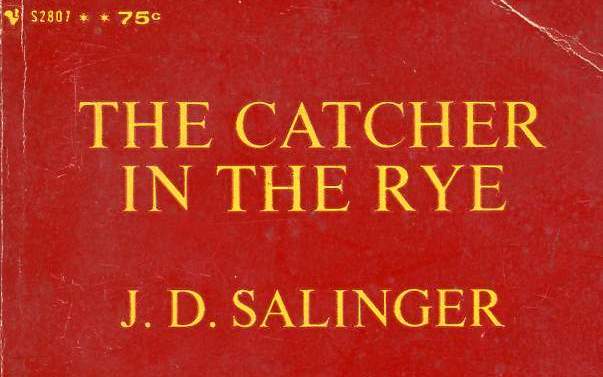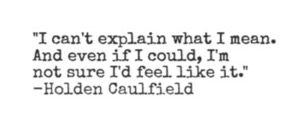I discovered J.D. Salinger’s seminal novel of teenage angst when I was in eighth grade. At the time I didn’t know anything about it other than the fact that it was widely considered to be a “literary classic”.
The cover provided no clues as to the book’s contents. It was simply a blank, maroon cover with the title and author’s name in gold Times New Roman capitalized. And the same on the back. There was no synopsis, no blurbs hailing it as a masterpiece, nothing except the author’s credit and that title.
Catcher in the Rye. What did that lousy title even mean anyway?
Even without really knowing anything about the novel, I felt compelled to read it. Not because I had to for school, because I wanted to. So I did. I don’t know exactly what it was about the mysterious little book that drew me in. It was probably that title.
I just had to know what the hell it meant.
By this point in my life I already had a lot of books under my belt, but almost all of them were fantastical in one way or another. It was a lot of sci-fi, sword & sorcery, and, like most horror-obsessed kids of my generation, the complete works of Stephen King.
Catcher in The Rye was to be my first foray into “serious” adult literature.
As a middle-schooler looking to expand my literary horizons, the idea of reading many of the so-called “classics” was a daunting one. Most of them were great, thick, books with impossibly small print in order to cram as many words on each page as possible. And although written in English, they seemed foreign to me. The language they used was somehow even more dense than the physical book in which held it. Many of these works were still intimidating to me when I had to read them in college years later, let alone as a thirteen year-old looking to read for pleasure.
But this book was different. It was short, especially when compared to the massive books I had recently tackled including, It and The Stand by the aforementioned Mr. King. Not to mention the print was normal sized. This was book I could easily digest, and I knew I could get through it, even it was a complete bore.
(Did I mention I have this thing about finishing a book once I start?)
Like I said, I had no idea what to expect when I started reading it. I certainly didn’t anticipate that it would completely change my life.
But it did. Like in a big way…
From the first paragraph my mind was blown wide open. It not only changed my whole perspective on what literature could be, it changed the way I looked at myself in relation to the world.
This was heavy stuff.
Of the countless books I had read up to this point, even the ones written in first person, none of them felt like they were speaking directly to me. Not really anyway.
They spoke to me in general sense. I was merely a passive witness to the narrator telling their story. This was different. I felt like Holden Caulfield was speaking directly to me personally, in a language I could understand and relate to. In fact, it was pretty much the same language my friends and I used when we were alone together, cuss words and all.
It is ironic that the main reason this book is one of the most frequently challenged and banned of all time is the language. Because without it, this book wouldn’t have had nearly the same impact on me. The fact that Holden spoke so bluntly and realistically is exactly why his words resonated so much.
One of the most heartbreaking things about adolescence is realizing that your idealized childhood perception of the world doesn’t really exist. For the first time you realize that there are a lot of Phonies, and life doesn’t always have a happy ending. It’s like a breath of fresh air for a young person dealing with this new sense of uncertainty to hear a voice that echoes their own, processing similar things in the same way. That language is part of what makes this book uniquely qualified as gateway to literature for disaffected youth.
The cover provided no clues as to the book’s contents. It was simply a blank, maroon cover with the title and author’s name in gold Times New Roman capitalized. And the same on the back. There was no synopsis, no blurbs hailing it as a masterpiece, nothing except the author’s credit and that title.
Catcher in the Rye. What did that lousy title even mean anyway?
Even without really knowing anything about the novel, I felt compelled to read it. Not because I had to for school, because I wanted to. So I did. I don’t know exactly what it was about the mysterious little book that drew me in. It was probably that title.
I just had to know what the hell it meant.
By this point in my life I already had a lot of books under my belt, but almost all of them were fantastical in one way or another. It was a lot of sci-fi, sword & sorcery, and, like most horror-obsessed kids of my generation, the complete works of Stephen King.
Catcher in The Rye was to be my first foray into “serious” adult literature.
As a middle-schooler looking to expand my literary horizons, the idea of reading many of the so-called “classics” was a daunting one. Most of them were great, thick, books with impossibly small print in order to cram as many words on each page as possible. And although written in English, they seemed foreign to me. The language they used was somehow even more dense than the physical book in which held it. Many of these works were still intimidating to me when I had to read them in college years later, let alone as a thirteen year-old looking to read for pleasure.
But this book was different. It was short, especially when compared to the massive books I had recently tackled including, It and The Stand by the aforementioned Mr. King. Not to mention the print was normal sized. This was book I could easily digest, and I knew I could get through it, even it was a complete bore.
(Did I mention I have this thing about finishing a book once I start?)
Like I said, I had no idea what to expect when I started reading it. I certainly didn’t anticipate that it would completely change my life.
But it did. Like in a big way…
From the first paragraph my mind was blown wide open. It not only changed my whole perspective on what literature could be, it changed the way I looked at myself in relation to the world.
This was heavy stuff.
Of the countless books I had read up to this point, even the ones written in first person, none of them felt like they were speaking directly to me. Not really anyway.
They spoke to me in general sense. I was merely a passive witness to the narrator telling their story. This was different. I felt like Holden Caulfield was speaking directly to me personally, in a language I could understand and relate to. In fact, it was pretty much the same language my friends and I used when we were alone together, cuss words and all.
It is ironic that the main reason this book is one of the most frequently challenged and banned of all time is the language. Because without it, this book wouldn’t have had nearly the same impact on me. The fact that Holden spoke so bluntly and realistically is exactly why his words resonated so much.
One of the most heartbreaking things about adolescence is realizing that your idealized childhood perception of the world doesn’t really exist. For the first time you realize that there are a lot of Phonies, and life doesn’t always have a happy ending. It’s like a breath of fresh air for a young person dealing with this new sense of uncertainty to hear a voice that echoes their own, processing similar things in the same way. That language is part of what makes this book uniquely qualified as gateway to literature for disaffected youth.
Holden didn’t just talk like me, he felt like me. He was lost and confused, disillusioned with the looming idea of adulthood as the candy-colored façade of his childhood slowly eroded.
Suddenly I didn’t feel so alone in the world.
But I think the thing about Holden that connected with me most was the fact that in spite of being so heavy-hearted, he was consistently hilarious. I mean really funny. I found myself laughing out loud throughout pretty much the entire book and I immediately locked in on the idea that despair could be tempered with humor. It most certainly informed my own artistic endeavors later in life when I pursued my own writing and embarked on the journey of becoming a stand-up comic.
In addition to providing me with a new perspective on myself and the world at large, reading Catcher in the Rye for the first time also made me realize that fiction doesn’t have to be fantasy in order to be engrossing. In fact, sometimes realism can be even more compelling. Nor does it have to fit neatly into one box. It can be humorous and sad, nihilistic and inspiring, heartwarming and gut-wrenching, or all of the above at the same time.
Plus, I finally learned what the hell that lousy title was all about…
Neil Young explored similar themes of teenage disillusionment in the song, "Sugar Mountain", written on his nineteenth birthday. Here's a performance of it from the 1979 concert movie, Rust Never Sleeps.
Suddenly I didn’t feel so alone in the world.
But I think the thing about Holden that connected with me most was the fact that in spite of being so heavy-hearted, he was consistently hilarious. I mean really funny. I found myself laughing out loud throughout pretty much the entire book and I immediately locked in on the idea that despair could be tempered with humor. It most certainly informed my own artistic endeavors later in life when I pursued my own writing and embarked on the journey of becoming a stand-up comic.
In addition to providing me with a new perspective on myself and the world at large, reading Catcher in the Rye for the first time also made me realize that fiction doesn’t have to be fantasy in order to be engrossing. In fact, sometimes realism can be even more compelling. Nor does it have to fit neatly into one box. It can be humorous and sad, nihilistic and inspiring, heartwarming and gut-wrenching, or all of the above at the same time.
Plus, I finally learned what the hell that lousy title was all about…
Neil Young explored similar themes of teenage disillusionment in the song, "Sugar Mountain", written on his nineteenth birthday. Here's a performance of it from the 1979 concert movie, Rust Never Sleeps.
Banned Books Week 2016: Celebrating our Freedom to Read (September 29th – October 1st)
http://www.bannedbooksweek.org/
http://www.bannedbooksweek.org/



 RSS Feed
RSS Feed